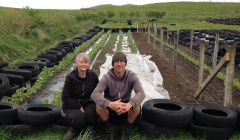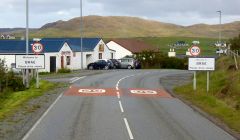Climate / SIC keen to identify projects to ‘get us to net zero’, new climate team leader says
Claire Ferguson heads up Shetland Islands Council’s new climate change team – and she is keen for ‘open dialogue’ with the community on the subject
THERE is “huge appetite” within the community for action to ensure Shetland plays its part in global efforts to tackle climate change and reduce per capita carbon emissions currently almost double the Scottish average.
That is the view of Shetland Islands Council’s (SIC) new climate strategy team leader Claire Ferguson, who moved back home to take up the post earlier this year.
She has returned to a community whose carbon footprint stands at 10.2 tonnes of CO2 per capita. Although that is down from 13.3 tonnes back in 2007, it remains vastly greater than the national average of 5.3 tonnes – partly a consequence of a dispersed rural population with a colder climate and heavily polluting transport and industry.
With Scotland hosting the United Nations’ COP26 summit in Glasgow this November, despite competing for news print space with the Covid-19 pandemic, climate change is perhaps now coming into sharper focus than ever before.
The Scottish Government has set a “net zero” carbon target for the year 2045 and the SIC intends to draw up various models defining what action would be necessary to reach “net zero” by then, or perhaps even as early as 2030.
Earlier this week an online survey was launched as part of what the SIC intends to be an ongoing “climate conversation” looking at energy, transport, business, industry and recycling within the community.
“We’re modelling different scenarios,” Ferguson tells Shetland News. “We absolutely have to hit 2045 – what has to be done with this route map is to see feasibly how early we could hit a target before then…how much more onerous it is to say 2030 rather than 2035 or 2040.
“Within the council itself, of our key emitters ferries are a big one, and secondary to the ferries throughout Shetland one of our biggest emitters is the built environment, houses, properties. A lot of that is to do with our unique location, where we are, weather, wind factor – that’s an area we’ll be looking to work on a lot.”
Become a member of Shetland News
Between its oil reserves and pension fund the local authority has hundreds of millions of pounds invested on the stock market, largely through fund managers using “market tracker” investments that will including stocks in numerous carbon-emitting companies.
Internationally there are nascent signs of boardroom action to divest from fossil fuels and, while previous attempts by some councillors to inject an ethical dimension into its investment strategy have been unsuccessful, Ferguson acknowledges it is “something we’re looking into” in relation to the climate crisis.
The SIC itself only has direct influence over some elements of Shetland’s carbon emissions, but Ferguson’s team is also tasked with examining what action different sectors of private industry might need to take.
In addition to looking at emissions created by islanders travelling outwith Shetland, tourism will come under the microscope – and the topic of cruise ships, often criticised for the heavy pollution they create – is “something that has come up” in initial conversations with the public.
Ferguson says part of her team’s challenge is defining where the “boundary” of Shetland’s emissions begins and ends, ensuring that “nothing is double counted or missed out”.
The online consultation is part of plans for an “open dialogue” with the community, Ferguson says, as the local authority seeks to establish a baseline for carbon emissions and “identify initiatives and projects that can take place to get us to net zero”.
Ferguson grew up in the South Mainland before going to university in Edinburgh 16 years ago, returning to Shetland in March this year to take up her new role.
She says that during last year’s Covid-19 lockdown she began realising “how much I missed home” and got “really homesick”.
“It’s just brilliant to get the opportunity to move back home again,” she enthuses.
Ferguson comes from a mechanical engineering background and has worked on introducing low carbon technology in the private sector.
She now heads a new SIC climate change team of four – with one further recruit to come – which will be based at Gremista. The team has been together for seven weeks so far “getting up to speed with what our scope is going to be”.
With emissions nearly double those of your average Scottish mainlander, does that mean islanders will face twice as much upheaval in the transition to a post-carbon society?
Not necessarily. Higher emissions are not the consequence of some carefree attitude among individuals, more the upshot of a handful of major structural issues.
The SIC is looking to overhaul its ageing inter-island ferry fleet, which could mean a combination of switching to hydrogen-fuelled vessels and long-awaited fixed links connecting some of the outer isles.
“Ferries is one of our biggest emitters,” Ferguson says. “That is going to make a huge difference – a bit of technological innovation that we’ll need, a change in the way of doing something.”
Shetland is also off the national electricity grid, reliant on a heavily polluting diesel power station and a local grid with limited capacity for renewables, but that will change once an interconnector cable is installed as part of the Viking Energy wind farm, and “once that is addressed that is a big chunk of it”.
“It’s not all on what we can do individually,” Ferguson explains. “It is a combination of policy and regulation, and then behavioural change – individuals and communities, and also industry, government and agencies.
“There is huge appetite already in the community for this. It feels like a big move at the right time. Nationally and globally there’s a real spotlight shone on this now [with] a movement behind it.”
Ferguson hopes the council can help link-ups between existing campaigns and groups, harnessing the enthusiasm of people who “have a real passion for doing something in this area”.
Interest is particularly high among younger generations. The schools service, like all council departments, is looking at what more it can do and Ferguson says the intention is for her team to go into schools and run workshops.
She adds: “We want to make sure they are targeted at younger generations because we know there’s a lot of interest there – younger people are interested in making a difference and want to talk about it.”
Become a member of Shetland News
Shetland News is asking its many readers to consider paying for membership to get additional features and services: -
- Remove non-local ads;
- Bookmark posts to read later;
- Exclusive curated weekly newsletter;
- Hide membership messages;
- Comments open for discussion.
If you appreciate what we do and feel strongly about impartial local journalism, then please become a member of Shetland News by either making a single payment, or setting up a monthly, quarterly or yearly subscription.

















































































